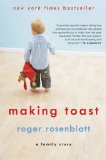Summary | Excerpt | Reviews | Beyond the book | Read-Alikes | Genres & Themes | Author Bio

The Pleasures and Regrets of a Husband, Father, and Son
by Michael ChabonThe Pulitzer Prize-winning author— "an immensely gifted writer and a magical prose stylist" (Michiko Kakutani, New York Times)—offers his first major work of nonfiction, an autobiographical narrative as inventive, beautiful, and powerful as his acclaimed, award-winning fiction.
A shy manifesto, an impractical handbook, the true story of a fabulist, an entire life in parts and pieces, Manhood for Amateurs is the first sustained work of personal writing from Michael Chabon. In these insightful, provocative, slyly interlinked essays, one of our most brilliant and humane writers presents his autobiography and his vision of life in the way so many of us experience our own lives: as a series of reflections, regrets, and reexaminations, each sparked by an encounter, in the present, that holds some legacy of the past.
What does it mean to be a man today? Chabon invokes and interprets and struggles to reinvent for us, with characteristic warmth and lyric wit, the personal and family history that haunts him even as—simply because—it goes on being written every day. As a devoted son, as a passionate husband, and above all as the father of four young Americans, Chabon presents his memories of childhood, of his parents' marriage and divorce, of moments of painful adolescent comedy and giddy encounters with the popular art and literature of his own youth, as a theme played—on different instruments, with a fresh tempo and in a new key—by the mad quartet of which he now finds himself co-conductor.
At once dazzling, hilarious, and moving, Manhood for Amateurs is destined to become a classic.
Throughout, Chabon's prose moves elegantly from humor to honesty to poignance. He strikes just the right amount of vulnerability - truthful but not divulging, candid but not crass. Even in nostalgia and regret, the voice is neither sentimental nor self-absorbed. Chabon simply tells his stories...continued
Full Review
(383 words)
This review is available to non-members for a limited time. For full access,
become a member today.
(Reviewed by Julie Wan).
 Several months before the release of Chabon's Manhood for Amateurs, his wife, writer Ayelet Waldman, published a memoir called Bad Mother: A Chronicle of Maternal Crimes, Minor Calamities, and Occasional Moments of Grace, which offers another look at the Chabon/Waldman family.
Several months before the release of Chabon's Manhood for Amateurs, his wife, writer Ayelet Waldman, published a memoir called Bad Mother: A Chronicle of Maternal Crimes, Minor Calamities, and Occasional Moments of Grace, which offers another look at the Chabon/Waldman family.
The book stems partly from Waldman's controversial essay published in the New York Times' "Modern Love" column, in which she confessed to loving her husband more than her children. In these 18 essays, Waldman fleshes out her relationship with her four children and her husband, writing with raw, sometimes funny, sometimes heart-wrenching candor about the challenges of motherhood in modern times. Included in the book is an essay on her decision to abort a fetus with...
This "beyond the book" feature is available to non-members for a limited time. Join today for full access.

If you liked Manhood for Amateurs, try these:

Battle Hymn of the Tiger Mother
by Amy Chua
Published 2011
An awe-inspiring, often hilarious, and unerringly honest story of one mother's exercise in extreme parenting, revealing the rewards - and the costs - of raising her children the Chinese way.

by Roger Rosenblatt
Published 2011
When his daughter, Amy, died suddenly of a heart condition, Roger Rosenblatt and his wife moved in with their son-in-law and their three young grandchildren. His story tells how a family makes the possible out of the impossible.